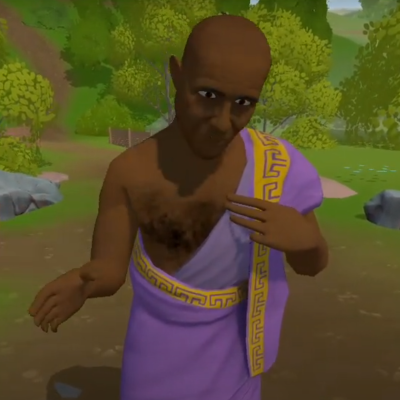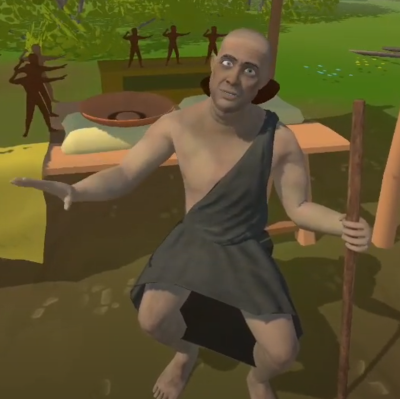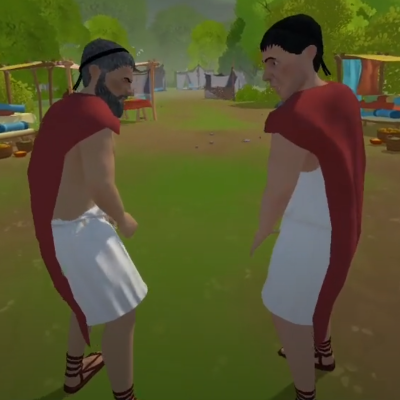Resources for teachers
The VRO and its accompanying historical resources have been designed to complement and extend the OCR A-Level Classical Civilisation syllabus, and it has a number of links to the OCR A-level curriculum.
The primary audience for the VRO is A-level students and teachers studying for the OCR A level in Classical Civilisation, especially the Key topic, ‘Personal experience of the divine’, focusing on ‘the oracle at Dodona’. The VRO can also be used to support teaching related to the ancient world and religious experience more generally.
This page introduces the ancient site of Dodona and you can find on it links to historical resources about the oracle, references and images. We have also provided some ideas for teaching.
The resources are suitable for Classics clubs as well as for gifted and talented groups, extended projects, and standalone workshops/enrichment sessions designed to introduce students to the ancient world or develop their knowledge.
The Oracle of Zeus at Dodona: an Overview
- What was the oracle of Zeus at Dodona?
- Oracles, or oracular sanctuaries, were sacred places where pilgrims could ask the gods questions about the past, the present or the future. At Dodona, pilgrims consulted with Zeus, king of the gods.
- Where was the oracle of Zeus?
- The sanctuary of Zeus of Dodona is in Epirus, northwest Greece. Pilgrims visited the oracle from all over the ancient Greek world.
- When was the oracle in use?
- The sanctuary was in operation for centuries, probably from the 8th century BCE until at least the 4th century CE. The earliest references to the sanctuary are in Homer's poems.
- How did the oracle work?
- Pilgrims wrote their questions to Zeus on lead tablets. Zeus is said to have responded to pilgrims at Dodona through an ancient oak tree in the sanctuary. It does seem likely that pilgrims left their tablets behind as dedications to Zeus.
- Who might you meet at the sanctuary?
- The pilgrims would meet sanctuary attendants and priestesses of Zeus, as well as traders in the campsite and market.
- Why did the ancient Greeks use oracles?
- Relying on oracles might seem unwise to us, and little different from tossing a coin. But the ancient Greeks believed that the gods could give them real guidance.
OCR A-level Curriculum Links
- The oracle at Dodona, including: the nature of the help and advice sought from the oracle by private individuals; also, comparison with Dodona and Delphi/Olympia.
- Personal religious choice and individual participation.
- The extent to which worship of the gods and heroes was Panhellenic, localised or personal.
- Levels of religious participation; household, deme, polis, Panhellenic.
- The reciprocal relationship between gods and mortals.
- Ideas about why ritual was performed.
- Priests and priestesses, including: the role of the priest in conducting rituals and the role of women in religious rituals.
- The role of sacrifice and libations in both state and private contexts.
- The role of votive offerings in both state and private contexts.
- Herodotus' accounts of the supernatural (including oracles).
Ideas for Teaching
Big Questions
- What is an oracular sanctuary?
- How does Dodona differ from other oracular sanctuaries in ancient Greece?
Talking Points
- Relying on oracles might seem unwise to us and little different from tossing a coin. Why did the ancient Greeks make use of oracles?
- All manner of people consulted the oracle of Zeus at Dodona. What influenced the different kinds of questions that people asked?
- What would you ask of an oracle today?
Creative Activities
Watch one or more of the stories and:
- Create a backstory for an ancient visitor to the oracle of Zeus at Dodona.
- Act out Visit 2. Does this help you understand why ancient people visited the oracle?
- Write your own script of a visit to Dodona.
- Create a storyboard of a visit to Dodona.
- Different oracles worked in different ways. Imagine an alternative ritual to the one depicted in the VRO.
The Stories, Scripts and Characters of the Virtual Reality Oracle
The VRO experience takes place over three 'visits' that each explore several themes relating to the oracle of Zeus at Dodona, the ritual of divination and the people who worked at and visited the site.

Visit 1
Synopsis
Meet Iolaos the trader and his family; Lysanias is worried about his child.
The Script
The Characters

Visit 2
Synopsis
Meet Diodorus the old soldier and see Xanthias, who escaped from slavery, reunited with his sister; ask your own question of the oracle.
The Script
The Characters

Visit 3
Synopsis
Meet two Spartan brothers worried about murder; hear from two traders in trouble and learn what Dorios the spirit raiser can offer.